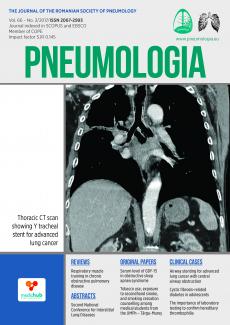Pediatric pneumology
Influence of cheeks support on the results of respiratory resistance measured by the interrupter technique in children
Sorin C. Man, Simona A. TatarInfluence of cheeks support on the results of respiratory resistance measured by the interrupter technique in children
Abstract
Introduction. Interrupter technique (TIF) determine the respiratory resistance and can be used successfully in children, even at low ages as it requires only minimal cooperation. Efforts to standardize this technique are focused on limiting the contribution of upper airway resistance during the measurement. Objective. Assessing the influence of cheeks support during the examination on the results of Rocc determined by TIF, both when used as basal examination or for measurement of bronchodilator response. Material and methods. Sixty-one children diagnosed with asthma were included. Rocc was determined in all patients with both cheeks supported, and without support. Forty-three children were subsequently performed spirometry in order to assess the correlation between spirometry and Rocc in the two situations described. To assess bronchodilator response two groups of children were studied, one with the basal and postsalbutamol measurements made with the cheeks supported and the other group with the same tests made without support. Results. Rocc mean values were higher when the cheeks are supported during the examination, the difference being statistically significant. Regarding the correlation with spirometry, there is a good correlation between FEV1, PEF, MEF50 and Rocc in both cases (P <0.001). ΔFEV1 correlated better with ΔRocc when cheeks were supported. Conclusions. Rocc measurements using interrupter technique with the cheeks supported registered higher values than those obtained in the absence of cheek support. Assessment of bronchodilator response using the interrupter technique is more accurate in terms of registration when performed with the cheeks supported.
Keywords: Respiratory resistance, interrupter technique, cheeks support, children




 Influence of cheeks support on the results of respiratory resistance measured by the interrupter technique in children
Influence of cheeks support on the results of respiratory resistance measured by the interrupter technique in children 